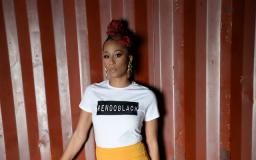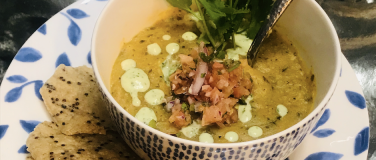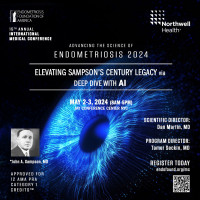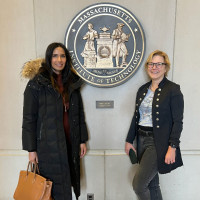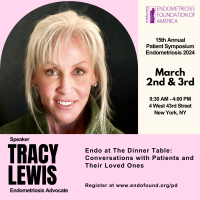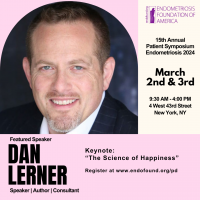I look at a cut-out photograph of a young Francis in a white dress, happily and curiously looking up, and my mind fills with things I would tell her about her future. How I wish I could warn her about the pains to come and where to find support. But I can’t tell her. So instead I will share bits and pieces of what I would have told my younger self.
Endometriosis and me. Over ten years together. Four surgeries endured. We are intertwined—quite literally, as endometriosis lives and grows inside of me. But instead of allowing my menstrual-related pain to suck the life out of me, I allowed it to give life to the conversations about menstruation in my everyday encounters. My menstruation experience even led me to taking a class about global menstruation and subsequently working with a Nepali NGO, Nepal Fertility Care Center (NFCC), that has programming in menstruation. It continues to be a restorative experience as I learn about my own menstrual health and menstrual health in the global context. My story is only one voice in the echoes of other’s lived experiences and in the narrative of menstrual health.
I remember when I was 13, I sat on the floor of my bathroom, hugged the ledge of the bathtub and waited for the pain of my period to pass. My pelvis felt like it was tearing itself apart, I was nauseous, and my body was sweating. Eventually I curled up in my bed and rocked myself to sleep. This was the beginning of a very telling menstrual experience, but I did not know what it was telling me until years later.
My period was unpredictable. I didn’t understand how my friends knew exactly when to expect their period. I had cramps long before and after my period, but at first, I didn’t know to even associate them with my cycle. So basically, I was in pain all of the time and cramps were a useless indicator of when I would begin bleeding.
In high school, I dreaded having to stand up and walk in front of my classmates and friends for fear of having bled through my pants. My fear was valid as I stained through several pairs of pants. And I used to wear the same Stanford sweater every day not only because it was big enough to hide my bloating belly but also because it was cardinal red, making it easier to conceal period blood when I stained through. My stress of bleeding through clothes reached a peak when our varsity basketball team voted on a white uniform, shorts and all.
Bleeding through my sports uniforms was a tipping point in my athletic and active life. I used to run laps around my high school track with little effort, but each day asked for an extra ounce of effort from me until I was the last one finishing the laps… or not finishing them at all. My body was in pain and I forced it through more pain in my feeble attempts to keep up with my teammates. I remember when I dragged myself to the edge of the court in complete and utter defeat.
From then on, I was always on the sidelines, quite literally. I didn’t know how to manage my symptoms. I also did not know how to talk about them. I smiled and laughed through the pain but felt anything but happy. I was diagnosed with depression soon after.
As I transitioned to college, my period pain worsened and if I wasn’t missing class or labs, I still wasn’t fully present. I became all too familiar with the clocks in the classrooms as I stared in agony waiting for the hands of the clock to reach the end of class. How was this pain normal? How did other menstruating students focus?
I didn’t have answers to my questions back then because I didn’t have the courage to ask them. I didn’t know that I could talk about my menstrual experience. I thought all of this was a normal part of menstruation and something to keep hidden like my pads. It wasn’t until my first of many trips to the emergency department during college that I was finally asked about my periods and had a conversation about my menstrual experience. Many of these ED trips were due to ruptured ovarian cysts.
I was diagnosed with PCOS at the time with speculation that I could also have endometriosis, so I was prescribed birth control in hopes of managing both. I had very little relief from the various types of birth control (from pills to the IUD), pain medications, and diets aimed to alleviate my symptoms. Which is when my second gynecologist suggested a diagnostic surgery.
After weeks of hammering it out with my insurance in between classes, I came to the disheartening conclusion that I could not afford the surgery. I called my gynecologist’s office and told them that I had to cancel my scheduled surgery because I couldn’t even afford the copay. I felt defeated as I walked to class. And yet again, I retreated to the edge, in complete and utter defeat.
You know that pain in your chest when you miss someone that isn’t there anymore? An empty, aching pain in the middle of your chest? An infiltrating sorrow? That was what I felt after cancelling my surgery. I was sitting in class at this private institution on the rich hills of Malibu and I couldn’t access the care I needed. I began to wonder what I was even doing there if I couldn’t focus in class, I was behind academically, even my academic advisor at the time urged me to consider switching out of a science major and not to pursue a career in medicine. The hope of having a solution to my pain and an improvement to my quality of life grew dimmer.
As I was having these thoughts, my phone kept vibrating so I stepped out of class to answer. That phone call changed my life. My gynecologist had called to tell me that my surgery remained as previously scheduled and that I would not have to worry about any of the costs, that it would be covered.
I share this with you because in the face of pain, frustrations, sadness, and hopelessness, my doctor showed me the compassion that I strive to show my own patients and community one day. I had the surgery and they found endometriosis speckled throughout my pelvic organs. They removed whatever of it they could see.
I finally had a name for my pain. Endometriosis. That physician validated my pain and restored my hope that had slowly drained for years. After recovery, I finally felt as close to a normal college student as I ever did. I could sit in hours of lecture and focus. I could sit at my desk at home or at the library and study, all without the debilitating pain I used to have. And I proudly graduated with my bachelor’s degree.
But the relief did not last long. I moved back home, and I had to find a new gynecologist. In the span of two years I had two additional laparoscopic surgeries to remove endometrial lesions. You would think that after three endometriosis ablation surgeries, I surely would have felt better. And for a few months I did, but the pain always came back with a vengeance. So, I went back to my provider seeking a way to manage this pain.
Her response: “At this point, we’ve done everything we can. Maybe you’ll get pregnant soon! The next time I want to see you is when you have a baby and you’re ready for a hysterectomy.”
She said it playfully without the slightest clue of how harmful her words were.
I did not react or say anything. I just walked out of the office. It felt like I was floating to the car as I processed what she had just told me. At first, I felt defeated. But then I was angry. I was angry because it was assumed that I wanted to have a baby… and soon. I was angry because of this narrative that a hysterectomy is the solution for all endometriosis patients. I was angry because excision surgery was never discussed as an option. I was angry because she was taking the easy way out.
Endometriosis symptoms are painful. IUD insertion and removals are painful. Transvaginal ultrasounds are painful. Pelvic exams are painful. But you know what else is painful? Trying to function through everyday activities like studying and doing laundry all while being thrown around in the medical ecosystem, from general practitioners, to specialists, to insurance companies, and back, then, to the pharmacy, back to the insurance company, back to the specialist, back to the general practitioner… it’s a mess. And it is unacceptable. The delayed diagnosis and inaccessibility to treatment should not be the norm.
We need earlier interventions for our fellow menstruators. We need to bring conversations about menstruation to the forefront of adolescent health in schools and in doctors’ visits. The menstrual experience can be very telling, as it was for me, but menstruators need to know how to talk about it and someone has to be listening and equipped with the knowledge to address issues that arise. This is why I launched a petition inspired by EndoFound’s recent legislative success in menstruation education. My petition targets Oregon legislative leaders to introduce a bill requiring Oregon school curriculums to include education on menstrual related disorders. It also aims to equip health care practitioners throughout Oregon with educational materials on menstrual disorders.
Education on menstrual related disorders is imperative to leading healthy and productive lives. It would equip people of reproductive age with knowledge about their own body along with best practices on how to be one’s own healthcare advocate. But it doesn’t stop there. It’s not enough to be equipped with information. Patients also need to have accessible, equitable, and quality care for menstrual-related disorders.
We also need to understand the way cultural and social structures, like family, discuss and influence various menstrual experiences. And we don’t have to shame these traditions, but instead present all the information on menstruation health available and respect an individual’s right to self-determination. My sweet mom wishes she would have better prepared me and supported me in my earlier menstrual experience, but her own mom didn’t know the intricacies of menstruation either. People remain silent in a culture where tampons are frowned upon because of the generational myth that these products take your virginity. I was silent for a long time too. But I refuse to remain quiet about things I have learned that would benefit others. To do so would be complicit in generational reproductive harms.
I unapologetically share my story because of my fellow endometriosis warriors who were never validated in their pain and succumbed to the misinformed narrative of their trusted providers. How many hopes and dreams curtailed? How many young menstruators are out there with undiagnosed endometriosis or other menstrual-related disorders? How long will it take for them to be diagnosed? How long will it take for them to be treated?
Francis Rojina is 26 years old from rural Malin, Oregon. She is a sister to two supportive sisters and the daughter of two loving immigrants from Mexico. With a high school degree from Lost River Jr/Sr High School, she continued her education at Pepperdine University earning her B.A in International Studies. She is currently an MPH candidate at Columbia University Mailman School of Public Health in the Heilbrunn Department of Population and Family Health. She cares about reproductive health, the wellbeing of migrant populations, and the health of adolescents facing adversity. She enjoys mentoring first generation students and has worked as a Diversity Coordinator at the Oregon Health Science University School of Nursing and as a Diversity Fellow at the Columbia Mailman Office of Diversity, Culture, and Inclusion. Right now, she is a Research and Knowledge Management Fellow for the Nepal Fertility Care Center (NFCC).
Francis aspires to serve, empower, and heal individuals and populations. Francis was diagnosed with endometriosis at age 22, taking ten years for the proper diagnosis. She has had four ablation surgeries for endometriosis and is still on a journey to proper treatment and healing. She is committed to seeing that the barriers that prevent her from achieving a healthier life are not the norm. With the skills she gains through an MPH, and eventually a medical degree, she hopes to mobilize change wherever she lives to build healthier communities without the health inequities and disparities she experienced growing up.



